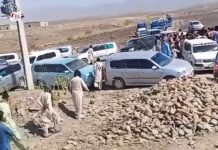Author: Tilak Devasher (Former Special Secretary, Cabinet Secretariat, Govt of India and the author of three acclaimed books on Pakistan)
The international outrage at the suspicious death of Baloch activist Karima Baloch in Toronto, Canada on December 20, 2020, is growing. Protests have been held all over Balochistan, in Canada, the US and even in Bangladesh. Her death refocused light on the death of another Baloch activist and journalist Sajid Hussain in Sweden in May 2020.
Notably, both were Baloch, both had sought refuge in the west after having escaped persecution and threats in Balochistan from the ubiquitous Pak security agencies, both continued to expose the gross violations of human rights in Balochistan and both died due to drowning. The similarities can hardly be called coincidences.
In Sajid Hussain’s case, the police did not find conclusive evidence of foul play and in Karima Baloch’s case, the initial finding is about the same, though a final report has not been made public at the time of writing. The Baloch Diaspora and many others are convinced that the deaths of Karima Baloch and Sajid Hussain were carried out by Pak agencies because their activities, statements and writings were hurting the ‘interests’ of Pakistan as defined by the army.
Apart from these two, there are other Pakistanis dissidents who have also sought refuge abroad after fleeing Pakistan where their lives were threatened and some were even kidnapped and physically abused. One example is of Ahmed Waqas Goraya who was attacked in 2020 and threatened outside his Rotterdam house. Another example is of journalist Taha Siddiqui. Having sought refuge in Paris he received multiple warnings about threats to his life.
The moot question is how has Pakistan managed to get away with such activities and how does it continue to do so?
The answer lies in the culture of impunity that has developed and even nurtured in Pakistan over the decades. If not earlier, it certainly began after the 1971 Indo-Pak war that led to the creation of Bangladesh. 195 Pakistani officers and soldiers had been identified as ‘war criminals’ for their role in the genocide carried out in the then East Pakistan. However, as a result of the ‘Delhi Agreement’ signed between India, Bangladesh and Pakistan these men and the 93,000 other POWs were repatriated to Pakistan. Whatever may have been the larger motives and objectives of the agreement, the one lesson that Pakistan and especially the army drew was that they could indulge in the most heinous of crimes, massacre millions of civilians and rape hundreds of thousands of women, but they would not be held accountable.
Reinforcing this was the fact that many of the 195 war criminals prospered on return, including making it to high positions in politics and the armed forces. The Pak army has since then institutionalized the lesson and made it part of their culture that there would be no accountability for their crimes.
This was amply demonstrated during the Baloch uprising of 1974-77 when mass killings of Baloch, including of women and children, using helicopter gunships took place under the watch of a civilian government headed by Z A Bhutto.
Fast forward to the early part of this century. Since at least 2004, the army has been carrying out a series of operations against the Baloch with the same brutality that it did in the then East Pakistan and with the same impunity. Despite Pakistan’s best efforts to keep its brutality in Balochistan under wraps, it has failed to do so due to the determination of the human rights organizations and the Baloch to bring to light what the army is doing to the people. As a result, the egregious violations of human rights have been well documented.
A report of the Human Rights Commission of Pakistan (HRCP) titled ‘Conflict in Balochistan, HRCP fact-finding missions, December 2005 – January 2006’ noted: (i) there were widespread instances of disappearances, of torture inflicted on people held in custody and on those fleeing from their house and hearth in fear. (ii) The security forces and decision-makers were completely unaccountable for the gross human rights violations in the province. (iii) There was a sharp rise in disappearances of those suspected of nationalist sympathies or links with the militants. Baloch dissidents have been the main victims of what the HRCP secretary-general described as a “barbaric and inhuman practice”. (v) There were alarming accounts of summary executions, some allegedly carried out by paramilitary forces. HRCP received credible evidence that showed such killings had indeed taken place. (vi) Despite constraints in the documentation, there was a consistent pattern of abuse of human rights in the province.
In its 2008 report, ‘Denying the Undeniable’ the Amnesty International (AI) noted that hundreds of people alleged to be linked to terrorist activities were arbitrarily detained ‘…denied access to lawyers, families and courts and held in undeclared places of detention run by Pakistan’s intelligence agencies with the government concealing their fate or whereabouts.’
The July 2011 Human Rights Watch report “We Can Torture, Kill, or Keep You for Years – Enforced Disappearances by Pakistan Security Forces in Balochistan” starts with an account of a person who had witnessed an enforced disappearance and was told: “Even if the president or chief justice tells us to release you, we won’t. We can torture you, or kill you, or keep you for years at our will. It is only the Army chief and the [intelligence] chief that we obey.”
Not a single perpetrator of these outrages has been arrested or prosecuted; in fact, police investigators openly admit they are not even looking for anyone. As Declan Walsh put it in a March 2011 article in The Guardian titled ‘Pakistan’s Secret Dirty War’: ‘The stunning lack of interest in Pakistan’s greatest murder mystery in decades becomes more understandable, however, when it emerges that the prime suspect is not some shady gang of sadistic serial killers, but the country’s powerful military and its unaccountable intelligence men.’ By this, the state has sent an unambiguous signal that the intelligence agencies not only have impunity to commit grave human rights violations but that it condones such egregious human rights violations.
The impact of the systematic human rights abuses carried out with impunity had made a vast number of Baloch people desperate. As the HRCP put it: In such a situation ‘a large section the Baloch youth has been driven into repudiating their allegiance to the state. When the people’s will is being broken, their voice ruthlessly stifled and their bodies charred in torture cells; where mothers are dying to hear any news of their disappeared children the state cannot expect any other reaction but one of rebellion.’
Even elected chief ministers of Balochistan have publicly accused the security forces of abductions and extrajudicial killings; lawyers have told the Supreme Court that the agencies were “lifting people at will”, to little avail.
Noted Baloch watcher Selig Harrison has called these violations ‘slow-motion genocide’, which unlike the humanitarian crises in Darfur and Chechnya, have not troubled the conscience of the world yet. But, he notes “as casualty figures mount, it will be harder to ignore the human costs of the Baloch independence struggle and its political repercussions in other restive minority regions of multi-ethnic Pakistan.”
The de-humanising nature of the violence is evidenced not just in the ways people are tortured — with holes drilled in the head and bodies mutilated beyond recognition — but also in the way their bodies are discarded. One note accompanying a decomposed corpse said, “Eid gift for the Baloch”. The similarity with the threat that KarimaBaloch received is indeed chilling. One such threat warned her that someone would send her a “Christmas gift” and “teach her a lesson”.
Given what the Pakistan army has been able to get away within the country, one view is that it has now decided to expand its operations abroad. Sajid Hussain’s suspicious death was perhaps to test the waters to judge the international reaction. The silence of the investigating agencies in Sweden obviously emboldened Pakistan and so Karima Baloch became the second victim.
If true, this should start alarm bells ringing because like these two there are many Pak dissidents who have sought refuge in the west with the hope of living out their lives in safety and without fear. If the west, as a bastion of safety, fails in its primary responsibility of bringing to book the perpetrators of these crimes, it will only encourage Pakistan to carry out even more attacks on its dissidents based abroad.
If Karima Baloch and Sajid Hussain’s killings are not be in vain then the world needs to recognize what Pakistan has been doing in Balochistan for decades and how it has been flagrantly killing Baloch youth and professionals in a desperate effort to secure its occupation of the province. Pakistan would do well to heed the warning of noted human rights activist I A Rehman who said ‘if we keep treating them [the Baloch] like we treated Bengalis, the consequences won’t be any different either.’
Disclaimer: The views and opinions expressed in this article are those of the author and do not necessarily reflect the official policy or position of The Balochistan Post or any of its editors.





























